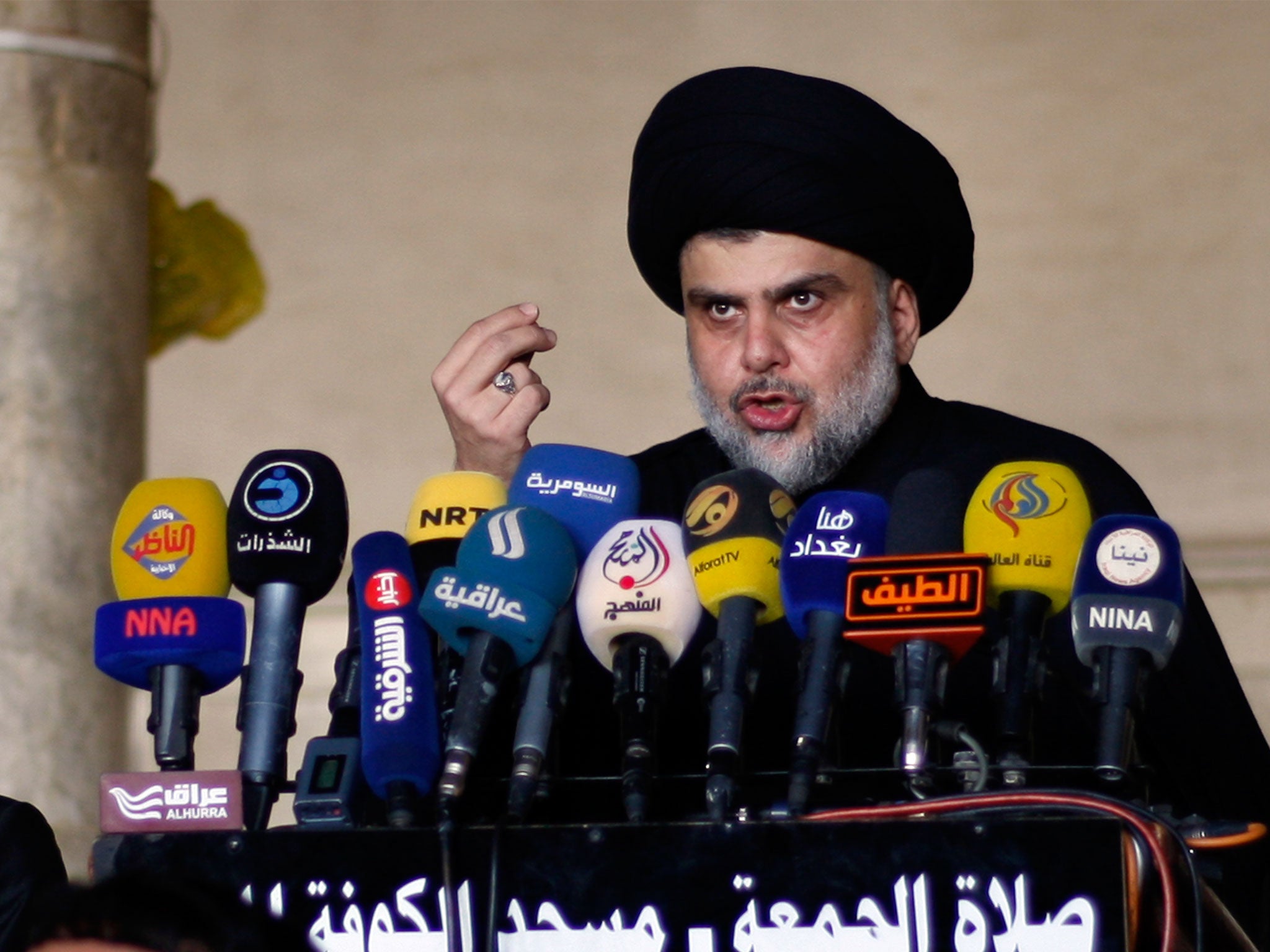Iraq election: Coalition led by nationalist cleric takes shock lead as vote count continues
Populist religious leader's unlikely alliance with secularists and communist party appears to have struck a chord with voters

Your support helps us to tell the story
From reproductive rights to climate change to Big Tech, The Independent is on the ground when the story is developing. Whether it's investigating the financials of Elon Musk's pro-Trump PAC or producing our latest documentary, 'The A Word', which shines a light on the American women fighting for reproductive rights, we know how important it is to parse out the facts from the messaging.
At such a critical moment in US history, we need reporters on the ground. Your donation allows us to keep sending journalists to speak to both sides of the story.
The Independent is trusted by Americans across the entire political spectrum. And unlike many other quality news outlets, we choose not to lock Americans out of our reporting and analysis with paywalls. We believe quality journalism should be available to everyone, paid for by those who can afford it.
Your support makes all the difference.A populist coalition formed by nationalist Shia cleric Moqtada al-Sadr has taken a surprise lead in Iraq’s election, putting a dent in prime minister Haider al-Abadi's re-election bid.
The country's electoral commission released results for 10 of the 19 provinces on Sunday evening, but has given no indication as to when more returns would be announced.
Mr al-Sadr appears to have tapped into growing public resentment in what some perceive as a corrupt political elite at the head of government.
Running a campaign highly critical of both the United States and Iran, the controversial cleric and militia leader has struck a chord with millions of poor Shia voters.
The 44-year-old will not become prime minister if his coalition wins as he did not stand in the election, but would be in a position to play kingmaker in the increasingly likely event of victory.
An election win would mark a stunning comeback for Mr al-Sadr, sidelined by Iranian-backed rivals as Tehran began asserting its influence in Iraq after the fall of Saddam Hussein’s regime in 2003.
Virtually unknown outside his home nation before the US invasion, Mr al-Sadr soon became a symbol of resistance to foreign occupation.
Much of his authority derives from his family, including his father, the grand ayatollah Mohammad Sadeq al-Sadr, who was assassinated for defying Saddam in 1999.
He became the first to form a Shia militia to fight against American troops after the 2003 war.
The Pentagon would later call his Mehdi army the biggest threat to Iraq’s security after he led two uprisings against US forces.
As news spread of Mr al-Sadr's gains at the ballot box, some of his followers celebrated in Baghdad, chanting “Iran out”.
“Iraq is rich, the country doesn’t need Iran, it can stand on its feet and be prosperous it just needs good management,” said Mohammed Sadeq, a trader in the city of Hilla who voted for Mr al-Sadr's list.
The cleric struck unlikely alliances in the formation of his coalition, shocking many by siding with secularists and the Iraqi Communist Party to form the bloc.
Known as Sairoon, Arabic for “On the Move”, the group has said it would focus on rebuilding infrastructure and providing health and education to the poor.
“The importance of this vote is that it is a clear message that the people want to change the system of governance which has produced corruption and weakened the state institutions,” said communist party secretary general, Raed Fahmy.
By contrast, incumbent prime minister Mr al-Abadi has performed poorly, placing third or fourth in many provinces and finishing as low as fifth in Baghdad.
In a national address on Monday, he vowed to keep the country safe under his command until a new government is formed.
“I call on Iraqis to respect the results of the elections”, he added.
Only 44 per cent of voters turned out, the lowest in the four elections since the removal of Saddam.
Under the Iraqi system, one of the dozens of coalitions formed for the election must gain a majority of the 329 seats in parliament in order to choose a prime minister and form a government, a process that may take months.
Political power in the country is traditionally divided along sectarian lines among the offices of prime minister, president and parliament speaker.
The Shia majority has held the position of prime minister in elections since the fall of the Saddam regime, while the Kurds hold the presidency and the post of parliament speak is held open for Sunnis.
Under the Iraqi constitution, no less than a quarter of the parliamentary seats must be held by women, with nearly 2,600 running for office this year.
Additional reporting by agencies
Join our commenting forum
Join thought-provoking conversations, follow other Independent readers and see their replies
Comments